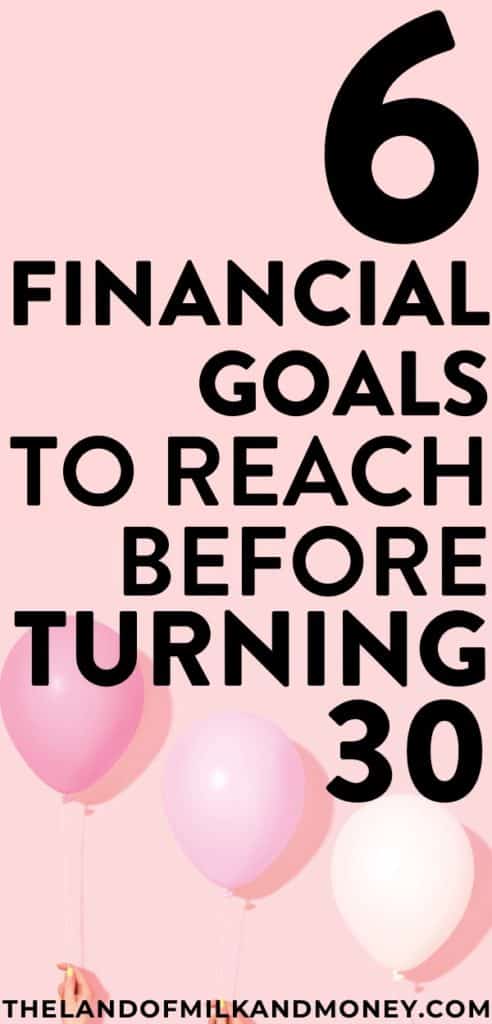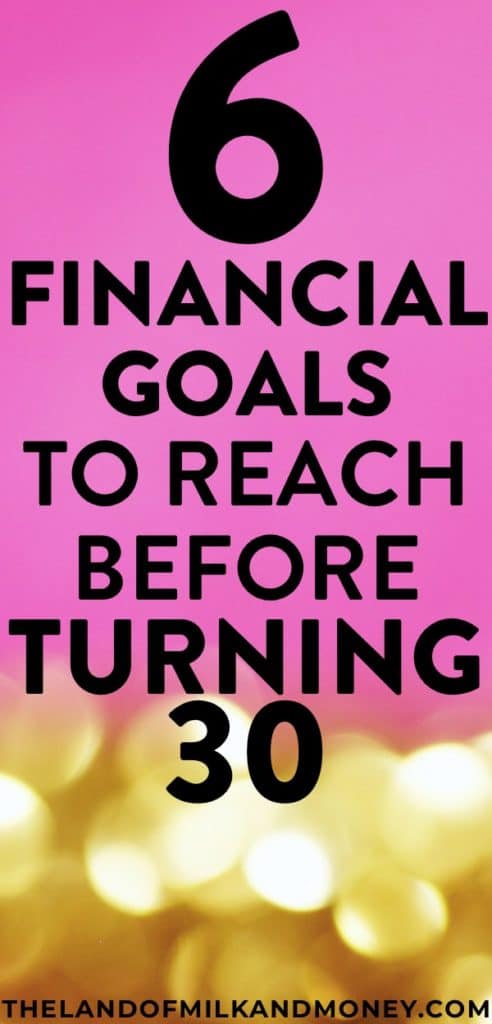If you’re coming up to the big three-oh, not only is it important to plan the mother of all birthday parties, but you should also start to focus on certain financial goals to reach before turning 30.

After all, you’re probably now a few years out of college – possibly with the student loans to match.
You may have recently taken out or be eyeing off a mortgage.
And none of that comes close to the massive financial decision of whether or not to have kids – if you haven’t crossed that hurdle already.
I’m not old – why should I focus on these financial goals to reach before turning 30?
You probably know that you should have started saving for retirement already, although that can be easier said than done.
And in any case, in your 20s, retirement seems a LONG way off.
At 30, however…suddenly that magic retirement age that you’re aiming for, whatever it is for you, seems a lot closer.
(In my case, it didn’t help that I found my first grey hair one week after turning 30. Thanks for the wake up call, universe.)
All of that said, turning 30 doesn’t have to be the Worst Thing Ever.
In fact, it can be a great opportunity to take a look at your financial situation, see what may need some work and adjust whatever needs to be changed to set yourself up for the coming years.
This is particularly the case given that you’re at an age where you likely have a few years of experience in your career, so your income should (hopefully!) be growing.
At the same time, you also have the greatest investment asset of all: time.
You still have a ton of time to get your finances in order and make sure your money is working for you, especially to take advantage of the magic of compound interest.
So getting things sorted out now is a great way to make sure that you’re set up for the future!
I’m already older than 30 – am I screwed?
Absolutely not.
I’ve said it before and I’ll say it again:
The best time to start managing your money was yesterday. The second best time is today.
So no matter how far past 30 you are, you’re already doing far better than others of your same age by even thinking about this stuff.
And by putting it into practice now – as opposed to not doing it at all – you’re immediately setting yourself up for a better financial future than people who don’t.
So keep reading to find out just what you should be aiming to achieve before – or even after – that all-important birthday.
1. Get your debt under control
First things first: this isn’t saying that you should have paid off all of your debt by now (although kudos to you if you have!)
Instead, you should make sure that you have a plan for how to get rid of it as quickly as possible, as well as making sure that you’re not living beyond your means and taking on more debt to pay for this.
In the case of student loans, you should definitely look into the possibility of refinancing them.
LendKey is one company you could turn to for this, given that it’s one of the major players in the world of student loan refinancing.
The company reports that it provides an average saving of $16,000 for each person who refinances their student loans with them.
And better yet, they refinance your loans for free!
You can read our full LendKey review for more information.
MORE INFORMATION: HOW TO REFINANCE YOUR STUDENT LOANS IN TWO MINUTES AND SAVE THOUSANDS
For other debt you hold, particularly credit card debt and other high-interest loans, you should make it an absolute priority to get it under control.
This is, without a doubt, the most important thing on this list that you can do for setting up your financial future.
This article includes a step-by-step strategy on exactly how you can pay off your debt. It’s not sexy but damn, it works.
And, importantly, it could save you thousands of dollars in interest on your debt.
FIND OUT MORE: THE DEFINITIVE GUIDE TO GETTING OUT OF DEBT
2. Start thinking about your retirement
I know, I know. You’re still young and fun and free – why do you need to think about your retirement?
Well, the answer is: Because the more time you leave yourself to get ready for retirement, the better off you’ll be.
But unlike those hangovers which are suddenly getting MUCH worse, planning for your retirement doesn’t have to be a headache.
Instead, it’s a good idea to start thinking about how much you think you’ll need to retire and when you want to do it.
That way, you’ll know just what financial decisions you need to make to get yourself there as easily as possible. You’ll especially find out how much you should currently be saving to reach your retirement goals.
Not sure where to start when trying to figure out how much money you’ll need? Check out this article: HOW MUCH MONEY DO I NEED TO RETIRE?
And if that number seemed a bit big, take a look at this post: THE ONE PRINCIPLE THAT WILL GUARANTEE YOUR FINANCIAL FUTURE
Here’s a hint: If you’re about to turn 30 and haven’t saved a cent, that second post may be the greatest thing you’ve read this week.
It will show you how if you start saving $200 per week, you’ll be a millionaire by your 60th birthday.
Not bad for a total investment of only $312,000 over your entire life!
And related to that point…
3. Set up your 401(k) (and maximize your employer benefits)
If you’re working for a company that offers employer matching on a 401(k) and you either don’t have one or you’re not contributing to it, then bad news: you’re throwing away free money.
This article explains exactly what a 401(k) is and why it’s so great, but essentially, it’s a retirement savings account offered through your employer that provides great tax benefits.
And many companies offer a scheme where they’ll match whatever you contribute to your 401(k).
These contributions are in addition to your standard salary (free money!) and aren’t taxable until you withdraw the money when you retire, which actually results in you paying less tax overall (more free money!).
Many people leave this as something they’ll do later, but the longer you take to set up your 401(k), the less money you’ll have.
And if you already have a 401(k) – pat on the back and a gold star!
Now try to make sure that you’re reaching the maximum amount of matched contributions offered by your employer.
You should also check that your 401(k) is set up as efficiently as possible for your individual circumstances, including that you’re not accidentally paying too much in fees.
(Which can cost you literally tens of thousands of dollars – see this article to find out exactly how.)
If you’re not sure what to look for, Blooom has a great FREE service that will run a health check on your 401(k) and let you know where you could make some changes to make sure that you’re making as much money as possible.
And remember: the sooner you fix those things up, the more money you’ll have at your retirement!
RELATED ARTICLE: HOW TO MAXIMIZE YOUR 401(K) BY TENS OF THOUSANDS OF DOLLARS
4. Establish great financial habits
It’s not an exaggeration to say that the habits you put in place now could make or break the rest of your financial future.
(And even if you’re north of 30 and reading this, there’s no reason why the same can’t apply to you!)
Did you know that more than half of Americans (57%) have less than $1,000 in their savings accounts? And that 39% have no savings at all?
At the same time, the average American household carries $137,063 in debt, despite the median household income being just $59,039 per year.
Having high debt and low (or no!) savings are absolutely what you want to avoid, no matter how old you are.
Unfortunately, this is largely due to people living beyond their means.
You may feel pushed to have a big car and a big house – resulting in big debt.
And this is all when having a big bank account is far better for your future.
So there are a few basic things you should do to make sure that you don’t fall into the trap of taking on more debt to live a life that you can’t sustain:
Great habit 1: Create a budget (and stick to it)
It sounds simple, but knowing exactly how much you’re spending – and how much you should be spending – in each budget category can be a lifesaver for your finances.
Sometimes you don’t even realise how much money is going to certain things until you sit down and crunch the numbers.
And then when you have these amounts in front of you, you can figure out just where you can start making cuts to save money.
If you do this regularly – say, once a month – you can see just how well you’re sticking to your financial goals, as well as which areas may need some more work.
Great habit 2: Make sure you have (and maintain) an understanding of your overall financial position
This may sound the same as having a budget, but that’s not quite the case.
Knowing your overall financial position helps you see how well (or, ahem, not) you’re doing.
This can be a good motivator to keep doing what you’re doing – or to fix whatever is causing problems.
It’s also a great way to see how far along the path you are towards the retirement goal that you set before in point 2.
There are a few totally FREE tools that I recommend for doing this:
To see your overall financial picture
Personal Capital allows you to connect all of your accounts (including your bank accounts, 401(k), investment accounts etc.) and cards to see your overall financial picture.
I can’t recommend this enough based on the great (and did I mention free?) information it gives you on where you are financially and, importantly, the areas where you can improve.
By clearly showing you where your money’s going in and where it’s going out, you’ll easily be able to see where you may be over-spending – perhaps without even realizing it – allowing you to focus your budget-trimming efforts on that area.
To see your credit score
Credit Sesame lets you see your credit score for free. This is definitely something that you should be keeping an eye on, especially if you’re about to enter your 30s and will probably be considering some pretty big purchases in the near future.
Having a good credit score can really make a difference in, say, how much you’ll be able to borrow for a mortgage and what interest you’ll pay on the loan.
So knowing your score now and being able to start improving it if needed could save you thousands of dollars in the long term.
To see your credit report
Credit Sesame can also give you your credit report for free!
Knowing what’s on your credit report at this (or any) stage of your life is of huge importance. Firstly, you should check that there are no nasty surprises that you weren’t aware of before, which may be an indication that someone has used your identity fraudulently.
You’ll also be able to see how your past activities have affected your credit, so that you can decide whether you should avoid those same things in future.
Just go to this page, hover over the “Credit Score” dropdown menu at the top of the page and click “Free Credit Report Card”.
And in case you’re worried, getting your credit report from Credit Sesame is a soft inquiry, which means that it won’t harm your credit score.
(This is different from a hard inquiry, which is what happens when you apply for a loan or a credit card and which can have a negative effect on your score.)
Great habit 3: Set up the right accounts
Here’s what you should have:
1. A checking account for your day-to-day expenses. This should only have as much in it as you actually need.
2. A savings account. This is where you should keep your emergency fund, which should be equivalent to three months of expenses just in case financial disaster strikes.
My personal favorite for this is the CIT Premier High Yield Savings Account. The interest rate is 1.55%, which is 22 times higher than the national average.
Better yet, it has no fees, so all your money is going towards earning you more money!
You MAY also want to have a different savings account if you’re saving up for a large purchase where the money will be used in the next 12 months or so, like buying a home. In that case, you could open a separate account with the same bank – which isn’t a problem when the account is fee-free.
3. A 401(k). Take a look at the summary above for why this is a good idea.
4. An investment account, such as a Roth IRA.
Starting to invest as early as possible to make your money work for you is of critical importance to setting up the rest of your financial life. Take a look at this article to see the enormous impact this can have on your future wealth.
And after you’ve opened up those accounts, I’d recommend that you look into automating your money as much as possible. It’s been proven that this is a great way to save more and spend less on unnecessary fees.
It also saves a ton of time, which is my favorite part!
FOR MORE INFORMATION: HOW TO AUTOMATE YOUR MONEY AND SAVE TIME IN 3 EASY STEPS
5. Put a good spending mindset in place
One of the main reasons why people spend their entire lives struggling to take control of their finances is due to lifestyle creep – or you may know it as “keeping up with the Joneses”.
We’re constantly told to measure our self-worth based on the car we drive or the clothes we wear. Who cares if it all goes on to the credit card, right?
Well, you might when you’re slammed with massive amounts of interest on that debt!
Instead, you should remember that getting rich comes down to two simple principles:
Spend less than you earn
Make your money work for you
We’ve covered the second point briefly above.
But on the first point, for me, I like to practice what’s called “intentional spending”. It means that everything you buy, ask yourself if you really, truly want it.
This isn’t exactly asking whether you strictly “need” it, because I definitely also buy “wants” too.
Instead, it’s about really thinking whether the item is actually worth spending money on. If you truly think that buying the item will bring you more joy than saving the money (and you can afford it), you should be good to go.
I also like to combine this with the “hourly rule”.
That is, work out your hourly income. Then, whenever you want to buy something, figure out how many hours of work it took you to earn that amount.
You’ll quickly see that some things really aren’t worth, say, a whole day of work just to buy it.
(And, on a related point, you should immediately start to make sure that you never spend more on your credit card than you’re able to pay off at the end of the month. Those fees add up way too quickly.)
RELATED ARTICLE: 27 WAYS TO TRICK YOURSELF TO SAVE MONEY
6. Invest in Yourself
It’s an unfortunate fact that most of us aren’t taught enough – or anything – about finances.
I’m a firm believer that schools should teach kids about managing their money and I’d even go so far as to say that colleges should have compulsory courses on personal finance.
Unfortunately, neither of those things are currently done, so we’re left to fend for ourselves.
This means that it’s critically important that you learn as much as possible about managing your money now to make sure that you understand exactly what you should be doing in the future.
(It also sounds really cool when you can start talking about investing at dinner parties. People think that you’re some sort of stock market mastermind, when all you’re doing is talking about index funds.)
When people ask, I always recommend the same three books to start learning about personal finance. Not only are they entertaining, but they’re written in a way that’s easy to understand while also being incredibly useful.
These are:
There are also one million personal finance blogs out there with a wealth (pun intended!) of information.
You can even sign up with us to stay up-to-date with our articles on how to save and make money!





